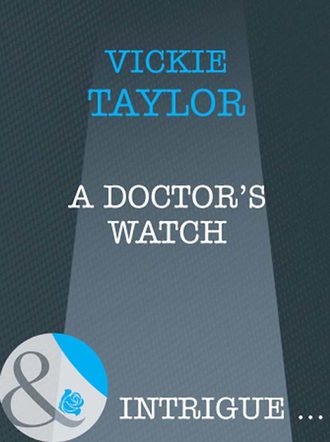
Полная версия
A Doctor's Watch
She wished Nana had brought clothes, instead.
“How are you feeling?” he asked.
“Fine,” she lied. Her hip hurt like hell. “The doctor gave me a clean bill of health.”
“Good. Do you know why I’m here?”
Her lips pressed together in a bleak smile. “You’re a psychologist.”
“Psychiatrist, actually. You know what happens next?”
She nodded and sat on the edge of the bed, her legs hanging over the side. She’d been through this before. At least he wasn’t patronizing her.
He asked a battery of questions. Her name. The date. The name of the current president. The immediate former president. Who’s buried in Grant’s tomb?
She looked up at him quizzically. “Grant?”
He grinned. “Just seeing if you were paying attention. Thought I had you there.”
“My son loves riddles. I hear that one, or some variation on it, at least once a week.”
“What happened this morning?” Dr. Handsome asked. His gaze followed her as she hopped off the bed and paced, limping. She didn’t want to do this, but he wasn’t going to let her go home to Todd until she did.
“Why don’t you just come right out and ask me?” she said, hating the impatience in her voice.
“Ask you what?”
“If I tried to kill myself again.”
“Did you try to kill yourself again?” he said without missing a beat.
“No.”
“But you have tried before.”
Statement, not question. No sense denying it, she thought. The facts would be in her medical record.
“A long time ago,” she said flatly.
“After you lost your husband?”
“And my sister six months before that, and my parents a year before that.” Her heart constricted painfully at the memory. Memories.
A moment of silence passed. “That’s a lot to go through in eighteen months.”
“Too much.” She turned to him, her lips pressed in a grim line. “Or so I thought at the time.”
His smile was gone, and the look that had replaced it brought a lump to her throat. His face glowed with a warm, quiet concern.
Compassion.
“But not anymore?” he asked.
She took a deep breath, raw at having to expose herself like this to a stranger. Most people had a right to privacy. To dignity. Not so the mentally ill, or those suspected of mental illness. They were expected to drag their deepest fears, their most personal vulnerabilities out for inspection by anyone with the right abbreviations or acronyms behind their names.
She considered lying, knew it would only delay the inevitable. He would pick at her until he got the truth.
Looking down, she saw her hands were trembling and clasped them together to hide the weakness. “I spent eight months in the hospital learning to deal with my grief. I clawed my way back to normalcy day by day. Sometimes minute by minute or second by second, but I made it.” She threw her chin in the air. “My doctor there had me keep a journal. I still do it. I record my good days and bad days and why each was the way it was. As of this morning, I’d had three hundred and ten consecutive good days. Three hundred and ten.”
When she dropped her gaze again, she realized she’d fisted her hands so tightly her knuckles had gone white.
Dr. Hansen gave her a few seconds to collect herself, then asked gently, “What happened this morning?”
She hesitated. “I fell.”
He checked the file, then said in that same placid, calming tone, “You told the police you were pushed.”
“I was confused. I hit my head.” She touched the knot on her temple as if to prove it. Damn it, she shouldn’t have to prove anything to him.
But she did, if she wanted to go home, and she did want to go home, even if it meant lying. She’d told the police and the first doctor who had examined her that she’d been pushed into the road.
It hadn’t gone over well.
She ducked her chin. She would not give him reason to call her paranoid. “Maybe some snow slid off the trees and hit me in the back. The sun was warming things up pretty good.”
She lifted her head. “Or maybe I just stumbled. That’s how I ended up in the road.” Desperately, she tried to give him a reassuring grin. It wobbled and she gave up. “I did not throw myself over a cliff on purpose.”
To her surprise, he smiled back. “Good.”
She rolled her shoulder, feeling the tension easing out. He believed her. Didn’t he?
He made a few notes on her file and then raised his head. “What were you thinking about before you fell?”
“Todd’s Christmas present. My son, he’s eight. I was deciding what to get him.”
He made a sympathetic noise. “Tough age to buy for. Young enough he still wants all the good kids’ toys, but too old to admit it.”
“Exactly.” She couldn’t believe he understood. Maybe there was more to him than a pretty face. “You have kids?”
“No, but I was one once. And I know how little boys’ minds work. I am male.”
Surprising herself, she swept her eyes from his broad shoulders to his lean waist, long legs and back up again.
Definitely male.
It had been a long time since she’d noticed that about anyone.
“So what did you decide on?” He grinned at her. She couldn’t decide if he knew exactly what she’d been thinking or if he was really as innocently naive as he seemed.
“I didn’t,” she explained, heat rising to her cheeks. Focus. She needed to focus on the conversation. She had no business noticing anything about this man. He was a doctor. The doctor who held the power to declare her sane or crazy. “I was wishing my husband were there. He would know what to get.”
“How did it make you feel that he wasn’t there?”
She snorted, suddenly disappointed in Dr. Handsome. “Oh, please. Not the ‘how did it make you feel’ question. How do you think it made me feel?”
“Sad? Lonely?”
She wrinkled her nose. “Have you ever been married?”
“No.”
“Maybe if you had, you’d have some inkling of what it means to be twenty-five years old, with a four-year-old baby and to lose all the family you have, not to mention the man you love, the only man you’ve ever been with, without warning. Until then, don’t pretend to understand what I do or don’t feel about my dead husband.”
He stilled the pencil he’d been twirling between his fingers and looked her right in the eye. “Well said, and with lots of feeling. You’re very good. How many doctors have you used that shtick on?”
The accusation took her aback. Until she recognized it as the truth. “A few.”
“Did it work?”
“More times than not.”
He strolled toward her, his tongue in his cheek. “Then you’ve been seeing the wrong doctors.”
He locked his golden gaze on hers and she couldn’t look away.
“Let’s try this again,” he said, towering over her. “How were you feeling just before you fell?”
The irrational urge to run swept over her. He was too close. Physically and emotionally. He smelled like Polo cologne.
And tasted like fear. Her fear.
She was not crazy. She wouldn’t let anyone say she was.
“If you want me to say I was depressed, you can go to hell,” she said.
“Been there. Didn’t care for it.” His face remained impassive, but his eyes changed. Cool intellect gave way to a dark, hot fury that burned somewhere deep inside him. The kind of fury only someone who has suffered could feel.
“Me neither,” she said. “Depression was my hell. I almost had to die to do it, but I escaped. I won’t ever go back.”
He looked away as if he suddenly found their linked gazes too intimate. “You’re one of the lucky ones, then.”
“I am.” She touched the scars on his right forearm and he flinched as though she’d burned him. “What about you?”
“I’m working on it.” He raised his head, cupped her chin and looked into her eyes again, his own fires now banked. “I—” His fingers tightened on her face. “Damn.”
“What?”
“Did the ER doctor give you something when he treated you? Pain medication? A sedative?”
“No.”
“Your pupils are big as dinner plates.” He let her go and cursed again. “I can’t sign off on the evaluation if you’re medicated.”
She followed him when he turned his back and marched away. “I don’t need to be evaluated. I just need to go home. To my son. Please.”
He groaned like a man in pain. “I can’t. I have to talk to you when your head is clear. I can’t afford to mess this up. Director Serrat—”
“Uncle Karl?”
He stiffened, and she knew she’d made a mistake mentioning her uncle. His boss.
He picked up his jacket and shrugged into it without turning. “I’ll come back to finish the evaluation tomorrow.”
“Let me go home and I’ll come to you in Belier in the morning.”
He shook his head. “I’m sorry. I just can’t risk it.”
Understanding exploded with a burst of bitterness on her tongue. “Worried about my life or your career?”
“Neither,” he said stiffly. “You have a son.”
Rage rose to the surface. “I would never hurt my son. Never!”
“I’ll talk to you tomorrow.” He headed toward the door, but stopped just inside, shoulders stiff.
“Wait. Please!” Desperation propelled her across the room after him. She stopped just short of touching him, her arm extended.
“Tomorrow,” he said without turning. “Try to get some rest. I’ll be back early.”
He was gone before she could argue. Before she could plead.
Alone again, Mia propped her hips on the edge of the bed, fighting back the desperation. The humiliation.
Maybe he was right. Maybe they were all right, and she’d imagined someone else with her on the bluff. A sinister shadow behind her.
Three hundred and ten days, she thought, her eyes welling with tears. She’d had three hundred and ten good days.
And tomorrow, she’d have to start over again at one.
Chapter 3
Ty felt like a heel as he left the Eternal Emergency Care Clinic. Not because he’d admitted Mia Serrat for overnight observation when she so clearly wanted to go home—standard procedure was standard procedure, and he dared follow nothing but when the patient was Karl Serrat’s niece. There was also her son’s safety to think about.
What troubled him was the niggle of pleasure he’d felt at the knowledge that, by admitting her, he’d have to see her again in the morning.
She was a patient, for Christ’s sake. He knew better than to think of her in any other terms.
She was also a woman, though. A spirited, strong-willed, self-reliant woman.
Exactly the kind of woman he liked.
Shivering, he turned the heater on full blast in his ancient VW Beetle and pulled out onto Highway 18 toward Belier. Snow swirled furiously around his little car, falling faster now than when he’d driven in, and whipped into a frenzy by a fierce north wind. Windshield wipers and headlights hardly penetrated the miasma.
He leaned forward, peering into the blizzard to make out the road, but instead he kept seeing her defiant green eyes, the determined set to her full lips.
He shook his head at himself. Mia Serrat was completely off-limits.
She also had a history of mental illness. She’d backed off her story about being pushed off the bluff this morning without argument, but she wasn’t convinced. He could see it in her eyes. She just knew the psychiatry game well enough to know better than to sound paranoid.
The sooner she was out of his life, the better.
Still, she pulled at him on a lot of different levels. Sure, she was beautiful. But she’d also overcome a lot of tragedy. She was a survivor, Mia Serrat. No way a woman trying to pick out a Christmas present for her kid had tried to kill herself. Suicidal people didn’t make plans for a future they wouldn’t be around to see.
On his left a steep rock wall angled back from the roadway. He slowed, squinting up at what he could see of Shilling’s Bluff. On impulse he swerved to the shoulder, parked and got out for a closer look.
More than the cold made him shiver as he stared up at the rough slope. How the hell had she come down that and into a busy road without being seriously hurt?
Killed.
It would, he thought, be a good place to kill someone.
He crossed the road and found a trail in the woods to one side of the bluff. Without stopping to question why, he climbed to the top.
He knelt. Lots of footprints in the snow here. Rounded and shallow as the wind smoothed off the edges and new snow filled the impressions, but definitely more than one person’s prints. Someone could have waited. Hidden in the trees—
His cell phone chirped, nearly sending him headfirst over the edge of the cliff.
He stood and turned away from the precipice to answer. His mother’s voice screeched at him across the line.
“Ty-baby? Is that you? You sound like you’re sitting on the wing of an airplane.”
He capped one ear with his hand. “I’m outside, Ma. It’s windy.”
“Outside?” she chattered. “In this weather? You’ll catch your death. What are you doing outside?”
He looked over his shoulder at the bluff, the nothingness beyond. What the hell was he doing? Trying to prove that Mia Serrat was as stable as she seemed? That she hadn’t imagined someone pushing her?
Or trying to eliminate one of his reasons for keeping her at arm’s length?
He swore and pulled his collar up as he started back toward his car. It was friggin’ freezing out here. Sure there were lots of footprints. The sheriff’s deputies would have checked out the scene after the accident.
“I’m headed back in, Ma. What did you need?”
He could hear Beethoven’s Fifth playing in the background. It always played in the background.
“I was thinking you could come see me this weekend,” she said, her voice more like a child’s than a mother’s now. “Maybe stay a little longer, even.”
His shoulders tensed. “I have a lot of work, Ma. Besides, you have an appointment with Dr. Calvin.”
“You’re a doctor. You can look after me.”
His free hand fisted in the pocket of his coat. He struggled to keep his voice steady. “I’m a resident, Ma. You know what that means? It means I have no life. No time. It means if I don’t keep my mind one-hundred-percent on the job, I might never be a doctor for real. Do you understand?”
“I could cook for you.” Her voice took on a dreamy tone. “I bet you haven’t had a decent meal in months. Do you remember when we used to make cookies together? I’d mix the batter and you’d lick the bowl?”
Ty bit his tongue. She’d never baked cookies for him in his life. Much less fixed him a decent meal. But she didn’t know that. She thought all her little imaginings were fact.
For a moment, he almost wished it were true—that his childhood had been idyllic. That he’d been her golden child and she’d been his storybook-perfect mother.
Only for a moment, though. If his mom hadn’t been the way she was when he was a kid, he wouldn’t have become the man he was now. What better motivation was there for becoming a psychiatrist than growing up in the clutches of a crazy mother?
Intellectually, he knew that her psychosis was a disease, an illness she hadn’t asked for and couldn’t prevent, but as a kid he’d only known the effect, not the cause. He’d known her mood swings, her temper. His mother had been sick, but too often, he’d been the one to suffer.
And yet, she was still his mother. He’d never been able to turn his back on her. Not completely. He closed his eyes. “Sure, we can do it again sometime,” he said softly. “But not right now, okay? I just don’t have time to b—”
He stopped himself just short of saying babysit.
“—to be with you. I should have a break around the end of the month. I’ll drive out for the day.”
“Only for a day? But I miss you, My Ty.”
He reached his car and ratcheted the door open with numb fingers. His stomach tightened. The assisted-living complex she lived in was only about ten miles from here. She was his mother, and she was lonely.
He was a doctor and he had responsibilities. He had patients to see and a whole caseload of patient files to update before 8:00 a.m.
“Look, Ma, I gotta go,” he said, ashamed to feel grateful for the Kaiser’s last-minute assignment, but grateful all the same. He just didn’t have the time, or the mental energy. Not right now. “I’ll try to get out there next week.”
He hung up without waiting for her acknowledgment. He folded himself into his car, blew on his hands and rubbed them together, wishing he could warm the cold knot of guilt in his chest as easily as he could warm his frozen fingers.
He started the car.
He’d give her a call and have a long chat when he got a break tomorrow, he promised himself.
Day after that, at the latest.
Mia jogged along the trail at the top of the bluff, her muscles burning, blood singing, breath puffing in front of her face. The view was beautiful from up here. The snow on the trees, the roads winding toward the valley, the village—
A hand hit her in the back. She felt the impression of the palm distinctly. Five fingers.
Falling. Pounding against rocks. Grating against frozen earth. Pavement—
Mia lurched to wakefulness, her heart pounding.
But she wasn’t on Shilling’s Bluff. Wasn’t falling into the road with a pickup truck bearing down on her.
She was in her hospital room. In the dark.
Her mouth was dry, so she sat up to search the bedside table for water. She could make out a chair beside the bed and a monitor—not active, thank goodness—on a cart across the room. A slice of light angled in through a narrow window on the door.
Her heart stalled, then raced as she stared at the door. She couldn’t see the handle.
She had to know.
Silently she slipped out of bed and padded into the light. Holding her breath she reached for the doorknob and turned it.
Not locked.
Her breath exploded in relief. For a minute she’d thought…
But, no. Thankfully, she’d been wrong. It wasn’t locked.
She should go back to bed. There was no reason to worry. She wasn’t a prisoner here, she hadn’t been involuntarily committed. She’d agreed—albeit with little real choice in the matter—to stay for observation of her own accord. In the morning, she’d make nice with Dr. Handsome and be on her way. She had to be calm. Composed.
Rational.
Unfortunately there was nothing rational about the fear skittering up her spinal column like a monkey on a vine. Or about her growing certainty that her fall hadn’t been an accident, despite what anyone else thought.
She hadn’t slipped; she’d been pushed.
Was she losing it again? Going crazy?
She couldn’t. Wouldn’t let herself.
She glanced at the bed, but the restlessness inside her wouldn’t let her sleep. What was the point of lying there and worrying?
She raised up on her toes and looked out the narrow window in the door. The nurses’ station down the hall sat abandoned. Silently she pushed the door open and padded toward the desk. Maybe her medical chart would hold some clue as to what had really happened. At the very least it would tell her what the doctors—Ty Hansen, in particular—were thinking about her.
Tightening the drawstring on her yellow flannel pajamas, she shuffled over to the cluttered workstation. On the upper level of the desk area, coffee rings topped untidy stacks of folders. Yellow sticky notes and phone message slips papered the lower tier.
Mia fingered the files until she found what she was looking for. She scanned the pages quickly. History of depression. Prior commitment to a mental-health facility. Mother-in-law concerned about her current state of mind.
What?
Oh, Nana…
Before she had a chance to read exactly what Nana had told the doctor, a shuffling sound around the corner caught her attention.
Footsteps.
Fear paralyzed her until it was too late to scurry back to her room unseen. She wouldn’t have worried about being caught by a nurse or orderly, but these footsteps didn’t sound as if they belonged to a hospital employee. They were too slow, too measured.
It seemed almost as if the person around the corner was sneaking down the hallway. Toward her.
Maybe she really was paranoid. She debated standing her ground, but gave in to fear, the memory of this morning’s shove firm in her mind—and on her back.
Out of time, she ducked behind the nurses’ counter. The footsteps shuffled slowly closer, but didn’t turn at the intersection of the two hallways. Instead they moved forward.
Toward the door to her room.
Heart thundering so loudly she thought surely whoever was out there would hear it, she raised up high enough to peek over the counter.
A slight man in baggy black sweatpants and an oversized black jacket stood outside her door. He looked over his shoulder as if to check whether he’d been seen. The hooded jacket hid his face, but Mia saw menace in the stoop of his shoulders, his careful step.
She held her breath as he pulled a vial out of his pocket. He uncapped a syringe with his mouth, drew the contents from the vial and tapped the bubbles to the top of the syringe. When he turned to check over his shoulder one more time, Mia ducked again.
That was no doctor. Even if it was, Dr. Hansen said she wasn’t to be medicated.
A feeling that something was very, very wrong crept over her. The intruder turned his back to her and flattened a hand on the door to her room, easing it open.
She hugged the wall with her back, then slid sideways, away from her room. Away from that man.
She was just about to turn the corner when her foot connected with the ball on a rolling chair. The chair clattered and crashed into the desk.
The intruder turned.
Mia gave in to panic and ran. Her bare feet slapped the cold tile, her footsteps in synch with the squeak of the intruder’s sneakers as he followed her. She banged open the door to an emergency stairway and launched herself toward the ground floor.
Even as she ran she realized she should scream. Find someone to help her. But the sound froze in her throat.
She’d screamed before. No one had heard her. Or if they had, they hadn’t cared.
The Eternal Emergency Care Clinic operated overnight with a skeleton staff. Most patients in need of extended treatment transferred to larger hospitals in Belier or Kyacy. Rarely did a patient stay overnight.
The building was virtually empty, except for her and a man with a syringe.
Mia ran faster.
The door to the stairwell clacked open behind her. Footsteps matched her hurried descent. She stopped at the ground floor and pushed through the exit.
A blast of frigid air hit her like a slap in the face. She had no way of knowing what time it was, but it was still dark. In the distance, a single streetlight lit the empty parking area. Drifting snow danced in its glow.
Mia backed inside the building and let the door close. She couldn’t go out there. She had no coat, no shoes. The parking lot was empty, the street deserted. Who knew how far she would have to run before she found help in a sleepy little village like Eternal?
A hysterical laugh bubbled out of her. She might be crazy, but she wasn’t stupid.
Hugging herself, she hurried down the final flight of stairs to what appeared to be the basement. There was no sign of the man chasing her, but he was coming. She could feel it. Gooseflesh bubbled on her skin.
Maybe she had imagined it, the way she had imagined someone pushing her on the bluff.
Somewhere above her, a door creaked open.
Giving in to her dread, she raced through a door marked Cafeteria. She yanked open drawers in the empty kitchen until she found a knife and then settled herself between a huge stainless-steel double sink and a stand of metal shelves.
She didn’t know who was after her, or why. If he really even existed or if he was a figment of her imagination, a bump on the head and medication.







